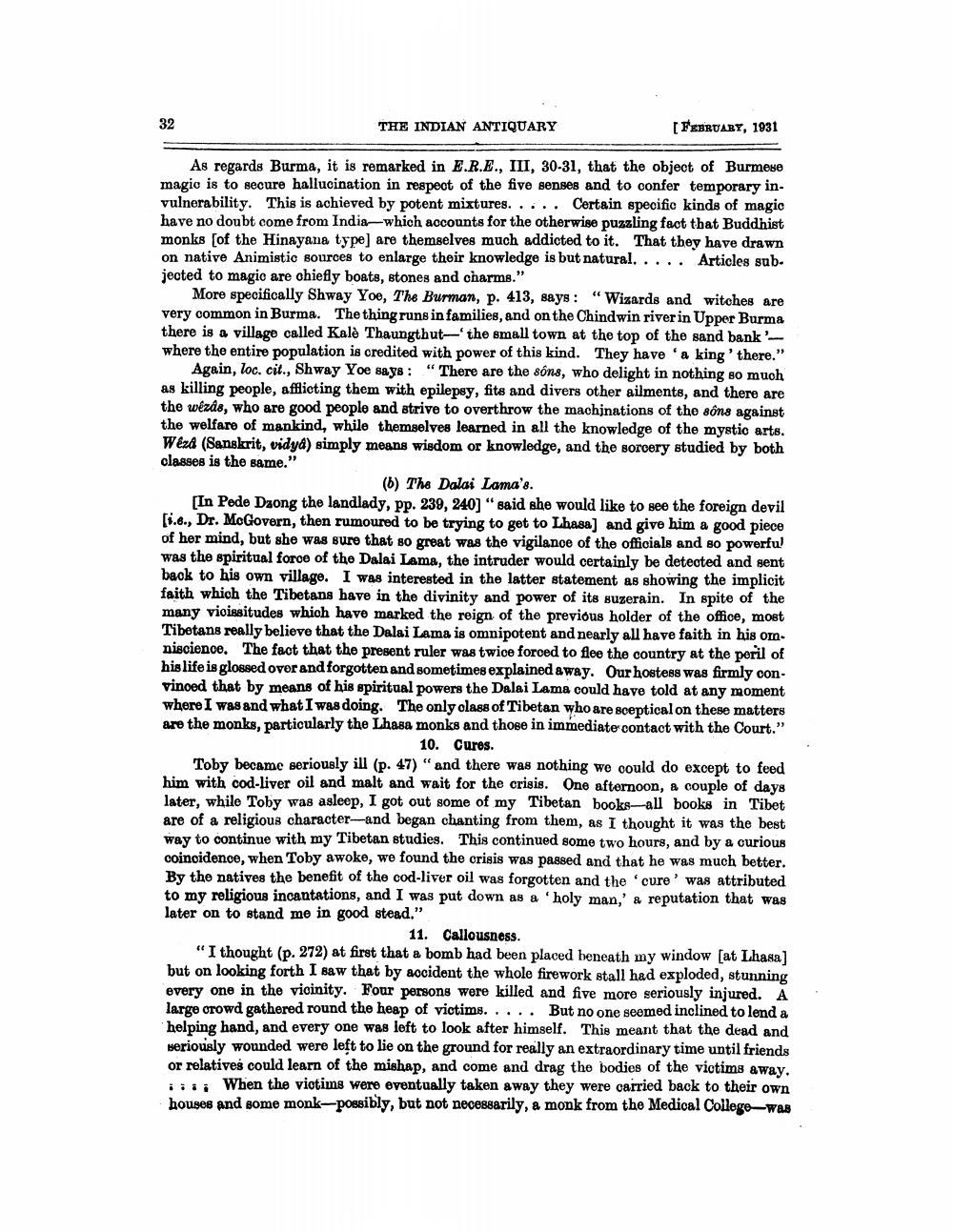________________
THE INDIAN ANTIQUARY
[ FEBRUARY, 1931
As regards Burma, it is remarked in E.R.E., III, 30-31, that the object of Burmese magic is to secure hallucination in respect of the five senses and to confer temporary invulnerability. This is achieved by potent mixtures. . . . . Certain specific kinds of magic have no doubt come from India which accounts for the otherwise puzzling faot that Buddhist monks (of the Hinayana type) are themselves much addicted to it. That they have drawn on native Animistic sources to enlarge their knowledge is but natural..... Articles subjected to magic are chiefly boats, stones and charms."
More specifically Shway Yoe, The Burman, p. 413, says: “Wizards and witches are very common in Burma. The thing runs in families, and on the Chindwin river in Upper Burma there is a village called Kalè Thaungthut-the small town at the top of the sand bank'where the entire population is credited with power of this kind. They have a king' there."
Again, loc. cit., Shway Yoe says: "There are the sons, who delight in nothing so much as killing people, afflicting them with epilepsy, fits and divers other ailments, and there are the wêzás, who are good people and strive to overthrow the machinations of the sốns against the welfare of mankind, while themselves learned in all the knowledge of the mystic arts. Weza (Sanskrit, vidya) simply means wisdom or knowledge, and the sorcery studied by both classes is the same."
(b) The Dalai Lama's. [In Pede Daong the landlady, pp. 239, 240] "said she would like to see the foreign devil (1.6., Dr. McGovern, then rumoured to be trying to get to Lhasa) and give him a good piece of her mind, but she was sure that so great was the vigilance of the officials and so powerful was the spiritual force of the Dalai Lama, the intruder would certainly be detected and sent back to his own village. I was interested in the latter statement as showing the implicit faith which the Tibetans have in the divinity and power of its suzerain. In spite of the many vioissitudes which have marked the reign of the previous holder of the office, most Tibetans really believe that the Dalai Lama is omnipotent and nearly all have faith in his om niscience. The fact that the present ruler was twice forced to flee the country at the peril of his life is glossed over and forgotten and sometimes explained away. Our hostess was firmly convinoed that by means of his spiritual powers the Dalai Lama could have told at any moment where I was and what I was doing. The only class of Tibetan who are soeptical on these matters are the monks, particularly the Lhasa monks and those in immediate contact with the Court."
10. Cures. Toby became seriously ill (p. 47) "and there was nothing we could do except to feed him with cod-liver oil and malt and wait for the crisis. One afternoon, & couple of days later, while Toby was asleep, I got out some of my Tibetan books-all books in Tibet are of a religious character—and began chanting from them, as I thought it was the best way to continue with my Tibetan studies. This continued some two hours, and by a curious coincidence, when Toby awoke, we found the crisis was passed and that he was much better. By the natives the benefit of the cod-liver oil was forgotten and the 'cure' was attributed to my religious incantations, and I was put down as a holy man,' & reputation that was later on to stand me in good stead."
11. Callousness. "I thought (p. 272) at first that a bomb had been placed beneath my window [at Lhasa) but on looking forth I saw that by accident the whole firework stall had exploded, stunning every one in the vicinity. Four persons were killed and five more seriously injured. A large crowd gathered round the heap of victims. . . . . But no one seemed inclined to lend a helping hand, and every one was left to look after himself. This meant that the dead and seriously wounded were left to lie on the ground for really an extraordinary time until friends or relatives could learn of the mishap, and come and drag the bodies of the victims away, Hiri When the viotims were eventually taken away they were carried back to their own houses and some monk-possibly, but not necessarily, a monk from the Medical College-was




